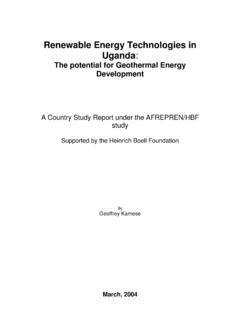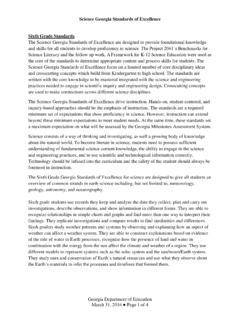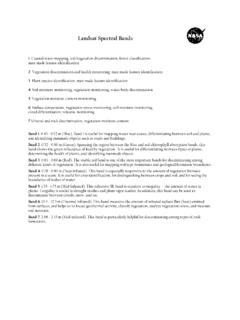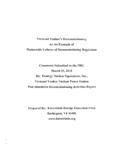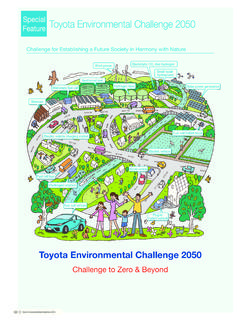Transcription of OECD Economic Surveys Indonesia
1 OECD Economic Surveys Indonesia October 2016 OVERVIEW This Overview is extracted from the 2016 Economic survey of Indonesia . The survey is published on the responsibility of the Economic and Development Review Committee (EDRC) of the OECD, which is charged with the examination of the Economic situation of member countries. This document and any map included herein are without prejudice to the status of or sovereignty over any territory, to the delimitation of international frontiers and boundaries and to the name of any territory, city or area OECD Economic Surveys : Indonesia OECD 2016 You can copy, download or print OECD content for your own use, and you can include excerpts from OECD publications, databases and multimedia products in your own documents, presentations, blogs, websites and teaching materials, provided that suitable acknowledgment of OECD as source and copyright owner is given.
2 All requests for public or commercial use and translation rights should be submitted to Requests for permission to photocopy portions of this material for public or commercial use shall be addressed directly to the Copyright Clearance Center (CCC) at or the Centre fran ais d exploitation du droit de copie (CFC) at OECD Economic Surveys : Indonesia OECD 201611 Executive summary The policy framework has been improving rapidly Boosting the efficiency of public spending would free up resources for moreproductive uses The performance of sub-national governments could be improvedEXECUTIVE SUMMARYOECD Economic Surveys : Indonesia OECD 201612 The policy framework has been improving rapidlyEconomic growth has slowedYear-on-year % growth, volumesSource:OECD Economic Outlook 2 has made great strides inimproving its Economic and social a weak global context and lower exportprices, growth has remained relatively has appropriately shifted towardsstrengthening product markets, improving thebusiness climate and reducing corruption.
3 Thefiscal position remains in good shape, in partthanks to energy subsidy reform. Poverty is alsobeing addressed by expanding various socialprogrammes, but food policies do not do enoughto protect the most vulnerable. And subsidies andpoor regulation, especially in energy and forestry,continue to distort activity and undermineenvironmental the efficiency of public spending would free up resources for moreproductive usesThe government is smallGovernment spending in % of GDP, 2014 or latestSource:OECD Government at a Glance 2 spending and taxation are low, even incomparison with other countries at similar levelsof development. Increasing revenues is a priorityto fund needed infrastructure and socialprogrammes.
4 In addition, strengthening public-sector governance and capacity (notably at thesub-national level) and reallocating expenditureaway from personnel and subsidies would raisethe efficiency of public spending and make itmore inclusive. Increased government spending,specifically capital spending linked togovernment-led infrastructure projects, hasprovided recent fiscal performance of sub-national governments could be improvedInequality across provinces is large% of national GDP per capita, 2014 Source:Statistics 2 , which began in 1998, hasbrought government closer to the , large inter-regional disparities persist,suggesting that best practices have not been fullyadopted. In some regions governance remainsweak and rent seeking is widespread, and inmany cases incentives are poor.
5 In the short termmore direction from the central government canhelp, but the fundamental solution is tostrengthen the capacity of sub-nationalgovernments over 10 0 10 20 30 2010 2011 2012 2013 2014 2015 2016 GDPI nvestmentExports of goods and services01020304050050100150200 EXECUTIVE SUMMARYOECD Economic Surveys : Indonesia OECD 201613 MAIN FINDINGSKEY RECOMMENDATIONSS etting macro policies for stable and sustainable growthSound macroeconomic policy frameworks have allowed impressive performance, but important challenges is likely to continue at a near-5% pace,although downside risks predominate, mainly on theexternal growth disappoints, employ a prudent monetaryresponse to stabilise output without endangeringfinancial revenues are low, even relative to peer countries,which is constraining the government s role revenue by increasing the number of taxpayersthrough better compliance and improving theefficiency of tax structural changeTo accelerate structural change towards high-value-added.
6 High-productivity sectors, fundamental reforms are protection discourages formal jobs andskills investment and reinforces impediments to hiring and dismissal, andprovide incentives for investment in good progress, corruption is still holding backgrowth and the fight against corruption by all the Corruption Eradication Commission (KPK),and provide it with more resources and the sustainability and inclusiveness of Economic growthEnvironmental, health and other issues remain serious impediments to sustainability and subsidies represent about 7% of publicspending. They encourage pollution-intensiveactivities and are poorly targeted. Coal-fired powergeneration is still out all remaining energy subsidies.
7 To meetrising power needs, invest in low-carbon generatingcapacity, including renewables and continues, as enforcement of lawsagainst clearing forest land by burning is and strengthen enforcement of laws on forestclearing. Improve productivity in the palm oil andtimber resilience measures often protect large andinefficient farmers, to the detriment of low-incomeconsumers. Food prices tend to be relatively high the importation of food. Refocus NationalLogistics Agency (BULOG) activities on managingemergency supplies. Phase out fertiliser nourishment and exposure to disease have leftover one third of all children under five existing programmes to tackle stunting,including by encouraging regional developmentLarge inter-regional disparities persist.
8 Regional development is increasingly determined by sub-national administrative burden on firms varies significantlyacross with the sub-national governments to move theregulation of business to best special Economic zones (SEZs) are to beestablished, in spite of their limited success to with different incentives in specialeconomic zones, including more flexible labourregulation, with a view to extending proven goodpractices to the whole governments, which now account for halfof all public spending, often underspend their budgets,impeding infrastructure investment in assistance to help regions to improve budgetplanning and implementation capacity. In the interim,make greater use of special allocation funds toprioritise sub-national SUMMARYOECD Economic Surveys : Indonesia OECD 201614 Boosting the efficiency of public spendingIncreasing the efficiency of public spending would allow more resources to be allocated to priority spending in key areas is shaped byspecific targets: for example, 20% for education and 5%for health.
9 While this provides ring-fencing, controlson how funds are spent are ahead with the implementation of performance-based budgeting ( money follows the programme ).Improve evaluation of existing and future programmes,and reinforce links with medium-term government transfers cover the entire cost ofsub-national governments public service the system of transfers from central to sub-national governments to remove the link with FINDINGSKEY RECOMMENDATIONSOECD Economic Surveys : Indonesia OECD 201615 Assessment and recommendations Recent macroeconomic outcomes and short-term prospects Equality and inclusiveness Advancing industrialisation by getting the fundamentals right Promoting regional development Improving public spending Ensuring food resilience Deforestation and other environmental challengesASSESSMENT AND RECOMMENDATIONSOECD Economic Surveys .
10 Indonesia OECD 201616 Over the past half century Indonesia has made remarkable progress across a broadrange of Economic and social dimensions. In general, health, education and other socialoutcomes have never been better, and higher standards of living are being enjoyed by moreand more Indonesians. Over the past two decades democracy has taken hold, and boldstrides in decentralisation have brought government closer to the people. As a member ofthe G20, Indonesia is actively engaged in world affairs, and Economic integration withregional ASEAN (Association of Southeast Asian Nations) partners is moving has strong growth potential: its population is young, the domestic market islarge, it has a rich endowment of natural resources, public debt is low, and its politicalsystem is broad-based and challenges for the years ahead are to diversify the economy by enhancing thenation s human resources, thereby allowing skill- and labour-intensive sectors of theeconomy to flourish, and to ensure that living standards and well-being rise for allIndonesians.










